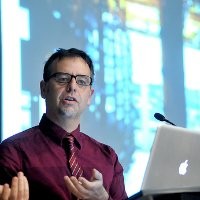
Ronald Deibert
- Courses7
- Reviews40
- School: University of Toronto
- Campus: St. George Campus
- Department: Political Science
- Email address: Join to see
- Phone: Join to see
-
Location:
Toronto, ON - Dates at University of Toronto: April 2002 - September 2015
- Office Hours: Join to see
Biography
University of Toronto St. George Campus - Political Science
Director, the Citizen Lab, Munk School of Global Affairs, University of Toronto
Higher Education
Ronald
Deibert
Toronto, Canada Area
I am Professor of Political Science and Director of the Citizen Lab at the Munk School of Global Affairs, University of Toronto. The Citizen Lab is an interdisciplinary research and development hothouse working at the intersection of the Internet, global security, and human rights. I was a co-founder and a principal investigator of the OpenNet Initiative and Information Warfare Monitor projects. I was one of the founders and a former VP of global policy and outreach for Psiphon Inc.
My main areas of research interest are the politics and security of cyberspace, with a special focus on filtering, surveillance and espionage. I was one of the authors of the Tracking Ghostnet report that documented an alleged cyber-espionage network affecting over 1200 computers in 103 countries, and "China's Great Cannon" report, which documented a new offensive cyber weapon operating on China's Internet gateway. Along with my colleagues at Citizen Lab, i do research on targeted digital attacks against civil society groups, privacy and security risks of popular mobile applications, and censorship and surveillance undertaken by companies and governments.
My book, Black Code: Surveillance, Privacy and the Dark Side of the Internet (Random House 2013) has been adapted into a documentary film, directed by Nicholas de Pencier, and distributed by Mongrel Media.
I serve on the editorial board of the journals International Political Sociology, Security Dialogue, Explorations in Media Ecology, Astropolitics, Review of Policy Research, and the Journal of Global Security Studies.
Specialties: Cyberspace politics, cyberspace security issues, multi-disciplinary research methods, Internet filtering, surveillance, and information warfare
Experience
OpenNet Initiative
Co-Founder and Principal Investigator
Ronald worked at OpenNet Initiative as a Co-Founder and Principal Investigator
Information Warfare Monitor
Co-Founder and Principal Investigator (project now closed)
Ronald worked at Information Warfare Monitor as a Co-Founder and Principal Investigator (project now closed)
Psiphon inc
Vice President, Policy and Outreach (Co-Founder)
Ronald worked at Psiphon inc as a Vice President, Policy and Outreach (Co-Founder)
University of Toronto
Director, The Citizen Lab, Canada Centre for Global Security Studies, Professor of Political Science
Ronald worked at University of Toronto as a Director, The Citizen Lab, Canada Centre for Global Security Studies, Professor of Political Science
Education
Queen's University
MA
Political Studies
The University of British Columbia
PhD
International Relations
Publications
Black Code: Inside the Battle for Cyberspace
Signal /McLelland & Stewart / Random House
Cyberspace is all around us. We depend on it for everything we do. We have reengineered our business, governance, and social relations around a planetary network unlike any before it. But there are dangers looming, and malign forces are threatening to transform this extraordinary domain. In Black Code, Ronald J. Deibert, a leading expert on digital technology, security, and human rights, lifts the lid on cyberspace and shows what’s at stake for Internet users and citizens. As cyberspace develops in unprecedented ways, powerful agents are scrambling for control. Predatory cyber criminal gangs such as Koobface have made social media their stalking ground. The discovery of Stuxnet, a computer worm reportedly developed by Israel and the United States and aimed at Iran’s nuclear facilities, showed that state cyberwar is now a very real possibility. Governments and corporations are in collusion and are setting the rules of the road behind closed doors. This is not the way it was supposed to be. The Internet’s original promise of a global commons of shared knowledge and communications is now under threat. Drawing on the first-hand experiences of one of the most important protagonists in the battle — the Citizen Lab and its global network of frontline researchers, who have spent more than a decade cracking cyber espionage rings and uncovering attacks on citizens and NGOs worldwide — Black Code takes readers on a fascinating journey into the battle for cyberspace. Thought-provoking, compelling, and sometimes frightening, it is a wakeup call to citizens who have come to take the Internet for granted. Cyberspace is ours, it is what we make of it, Deibert argues, and we need to act now before it slips through our grasp.
Black Code: Inside the Battle for Cyberspace
Signal /McLelland & Stewart / Random House
Cyberspace is all around us. We depend on it for everything we do. We have reengineered our business, governance, and social relations around a planetary network unlike any before it. But there are dangers looming, and malign forces are threatening to transform this extraordinary domain. In Black Code, Ronald J. Deibert, a leading expert on digital technology, security, and human rights, lifts the lid on cyberspace and shows what’s at stake for Internet users and citizens. As cyberspace develops in unprecedented ways, powerful agents are scrambling for control. Predatory cyber criminal gangs such as Koobface have made social media their stalking ground. The discovery of Stuxnet, a computer worm reportedly developed by Israel and the United States and aimed at Iran’s nuclear facilities, showed that state cyberwar is now a very real possibility. Governments and corporations are in collusion and are setting the rules of the road behind closed doors. This is not the way it was supposed to be. The Internet’s original promise of a global commons of shared knowledge and communications is now under threat. Drawing on the first-hand experiences of one of the most important protagonists in the battle — the Citizen Lab and its global network of frontline researchers, who have spent more than a decade cracking cyber espionage rings and uncovering attacks on citizens and NGOs worldwide — Black Code takes readers on a fascinating journey into the battle for cyberspace. Thought-provoking, compelling, and sometimes frightening, it is a wakeup call to citizens who have come to take the Internet for granted. Cyberspace is ours, it is what we make of it, Deibert argues, and we need to act now before it slips through our grasp.






